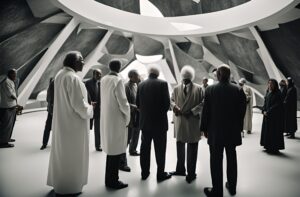
In the year 2050, a breakthrough in medical science changed the course of human history forever. Dr. Evelyn Carter, a brilliant biotechnologist, discovered a method to halt the aging process at the cellular level. This revolutionary treatment, dubbed “Eternalis,” promised eternal youth and immortality to anyone who received it. The world watched in awe as the first human trials showed remarkable success. People who were once frail and elderly regained the vitality and appearance of their younger selves. The implications of this discovery were profound, and the human race was forever altered.

The initial reaction to Eternalis was one of euphoria and celebration. Governments around the world scrambled to secure access to the treatment for their citizens. The global economy experienced an unprecedented boom as people realized they had endless time to pursue their dreams and ambitions. The concept of retirement became obsolete, and individuals began to explore new careers, hobbies, and passions without the fear of aging. The arts and sciences flourished as people dedicated centuries to mastering their crafts. The world seemed to be on the brink of a new golden age.
However, as the years passed, the darker side of immortality began to emerge. The population of the Earth skyrocketed, and resources that were once abundant became scarce. The planet struggled to sustain the ever-growing number of immortal beings. Wars broke out over access to food, water, and energy. The rich and powerful hoarded resources, while the poor and marginalized suffered. The gap between the haves and the have-nots widened to an unprecedented extent, leading to widespread social unrest and upheaval.
In response to these challenges, a global coalition of governments and organizations was formed to address the issues of overpopulation and resource scarcity. Strict regulations were put in place to control the distribution of Eternalis, and a lottery system was established to determine who would receive the treatment. This led to a black market for Eternalis, where desperate individuals paid exorbitant sums for a chance at immortality. The world became a place of stark contrasts, where some lived forever in luxury while others struggled to survive.
As the centuries passed, the psychological toll of immortality became apparent. Many people found it difficult to cope with the endless passage of time. Relationships that were once cherished grew strained and distant as the novelty of eternal life wore off. The concept of family evolved, with generations blending together in a confusing tapestry of age and experience. Some individuals, unable to bear the weight of immortality, chose to end their lives, leading to a rise in suicide rates. The human race, once united in its pursuit of eternal life, now faced a new existential crisis.

In an effort to address the growing sense of despair, a group of philosophers, scientists, and spiritual leaders came together to form the “Eternal Wisdom Council.” Their mission was to explore the deeper meaning of immortality and to help humanity find purpose in an endless existence. The council promoted the idea of “cycles of renewal,” encouraging people to periodically reinvent themselves and pursue new paths in life. They also advocated for a return to simpler, more sustainable ways of living, emphasizing the importance of community and connection.
The council’s teachings slowly began to take hold, and a new era of introspection and self-discovery emerged. People started to embrace the idea of living multiple lives within their eternal existence, exploring different cultures, professions, and philosophies. The arts and sciences continued to thrive, but with a renewed focus on sustainability and harmony with the natural world. The human race began to find a balance between the gifts of immortality and the responsibilities that came with it.
As the millennia passed, humanity evolved into a species that valued wisdom, compassion, and interconnectedness. The lessons learned from the early years of immortality shaped a new global society, one that prioritized the well-being of all its members and the preservation of the planet. The dream of eternal life had come with unforeseen challenges, but through resilience and adaptation, the human race found a way to thrive in its endless journey through time.




